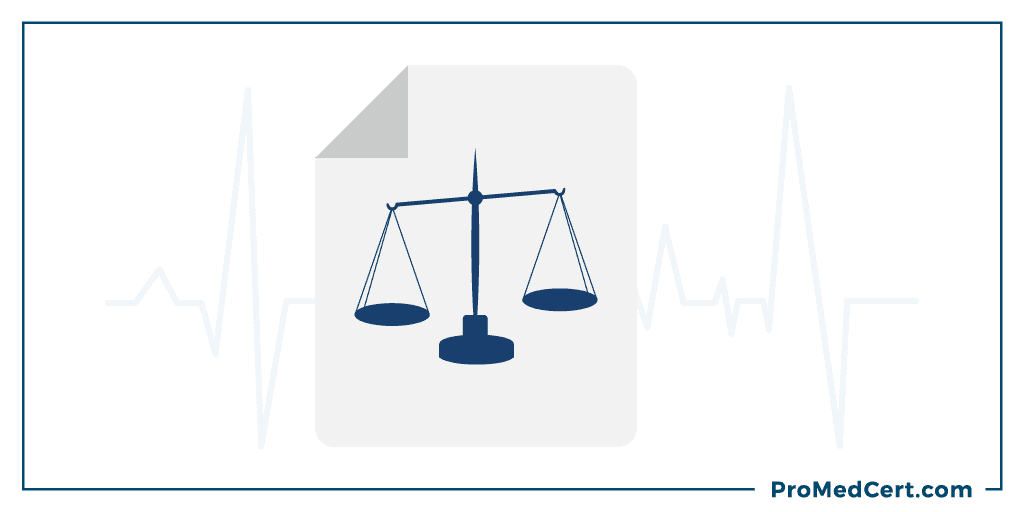5 Tips for Protecting Your Nursing License

Let’s face it. We’re all human, which means we are all prone to making the
occasional error. The problem is, when those errors occur in a medical setting and
it’s a nurse committing them on the job, it can lead to a whole bunch of problems,
up to and including loss of license. In fact, there are a number of different
blunders that could land you in hot water and jeopardize your career as a nurse,
such as falsifying patient records, unprofessional conduct and patient neglect.
You’ve worked hard to get to where you are today. You pushed through nursing school,
earned your degree, put in countless clinical hours and successfully passed the
state licensure exam. The last thing you want to do is put all that effort at risk.
To help prevent serious career-threatening mistakes and protect your license in the
event of a report or complaint filed against you, here are a few guidelines you
should follow.
Keep your contact information current with the state nursing board.

The very first step that the nursing board takes when it is investigating a claim
made against you is send you a letter via postal mail. As soon as you receive that
letter, you’ll have the opportunity to respond and set up a meeting with the
investigator assigned to your case. Timely response is key here, especially if your
job is on the line. Not only that, but the board can and will still move forward and
take action against you, even if you don’t respond, so make sure all of your contact
information on file is up to date and accurate. Otherwise, you could be in for a
nasty surprise.
Be honest on your job applications.

One thing many nurses don’t realize is that – rightly or wrongly – any action
brought against you from the board of nursing gets added to your permanent public
record. That means, chances are, your prospective employer is going to find out
about that complaint or disciplinary action that occurred all those years ago. As
tempting as it may be, don’t omit it. The fact is, even if you only worked somewhere
for a short time, or you believe the discipline was unfounded, when you sign the
application, you are affirming under penalty of perjury that you are providing
accurate information. Be honest and forthcoming, and hopefully you’ll have a chance
to explain the circumstances surrounding the situation further during your
interview.
Also be truthful on your renewal applications.

Understand going in what you are required to report when you renew your license. For
instance, if you’ve been arrested or pled guilty (or no-contest) to a criminal
matter of any kind, you have to report it. Even if you got a DUI and it was
dismissed, you need to report it to the nursing board. If there are questions on the
renewal application that you don’t fully understand or there is even just the
slightest bit of ambiguity in your interpretation, ask for clarification. Ideally,
seek legal advice from someone who is qualified and has experience practicing before
the nursing board. Always err on the side of caution.
Invest in nursing malpractice insurance.

There’s not a qualified doctor in the free world who would practice medicine without
first investing in malpractice insurance. Yet, many otherwise savvy nurses forgo
similar coverage of their own, and often to their own detriment. If you’ve been
putting off getting nursing malpractice insurance because you think it’s too costly,
you may be pleasantly surprised at how affordable it is. In fact, a decent policy
averages just around $100 a year. Having this in place in the event of a complaint
filed against you can help you pay an attorney, cover your lost wages and get
reimbursed for other expenses incurred while responding to the board.
Don’t go it alone.

Last, but certainly not least, you should never attempt to fight a nursing board
complaint on your own without, at the very least, consulting a qualified legal
professional. The board of nursing as well as the facility where the report or
complaint originated will undoubtedly have legal representation, and so
should you. An experienced nurse attorney (i.e. someone who practices both medicine
and law) will know the right questions to ask and can negotiate with the board or
your employer on your behalf to achieve more favorable results. To find someone who
can assist you, start with The American Association of Nurse Attorneys (TAANA.org).
Reports to the Board

Did you know that anyone can report a nurse to the board for any reason?
Furthermore, employers are allowed to put just about anything they’d like in your
employment records. And once these things are documented, they’re no longer
considered to be hearsay. To protect yourself in advance, whenever you are told of
something be placed in your employment record, write a response and have that placed
in your record as well. This will help should a time come when you are being
questioned by the board. If you discover that someone has filed a report against
you, be prepared to respond accordingly. Make a list of all the good things you’ve
done in your career, and be honest in your responses to the board’s questions. If an
incident is brought up that you don’t remember, say so. And, again, hiring an
experienced lawyer to represent you may be the best investment you could make.
At the end of the day, it’s up to each individual nurse to take the steps necessary
to protect themselves and their hard-earned licenses. Following the five steps
listed above and tapping into the knowledge and experience of a qualified legal
professional can help you keep your career on track and avoid the potential costly
and devastating consequences of an honest mistake. For more health care industry
tips, tricks and advice, please follow our blog or subscribe today to receive
fresh content delivered right in your inbox.
Disclaimer We are not attorneys or legal representatives. The tips provided above are meant for informational purposes only and should not be considered legal advice. You should always consult with a licensed attorney for legal guidance.

